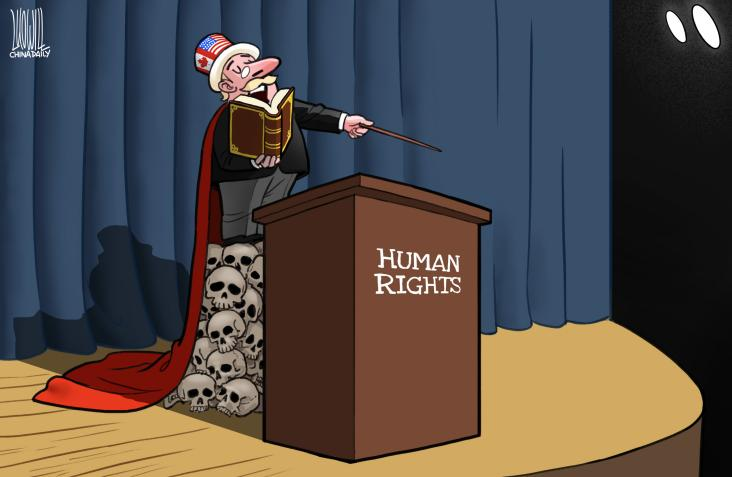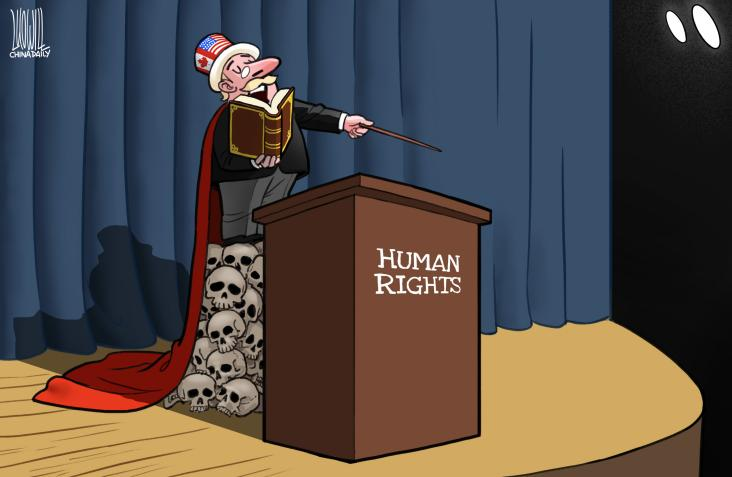



Photo Source: China Daily
"To maintain its political interests and global hegemony, the United States has brazenly resorted to human rights politicization in the international community through such means as adopting selective and double standards and imposing unilateral coercion. Its behaviors have seriously eroded the foundation that underlies the global human rights governance, gravely threatened the international development of human rights cause, and generated outrageously destructive consequences." This is the conclusion of a research report titled "US Politicization of Human Rights Erodes Foundations of Human Rights Governance," released by the China Society for Human Rights Studies on December 27. The report systematically compares the historical development of the politicization of human rights in the US, provides an in-depth analysis of the deep-seated causes and manifestations of the politicization of human rights in the US, and profoundly points out the disastrous impact of the politicization of human rights by the United States on global human rights governance.
Human rights is a great term. The enjoyment of human rights for all is the common pursuit of all mankind. Since World War II, with the joint efforts of the international community, the cause of international human rights has developed rapidly, and global human rights governance has entered a stage of institutionalization and rule of law. At the same time, the politicization of human rights led by the US has gone against the trend of history and seriously threatened the healthy development of global human rights governance. The US has adopted a pragmatic approach to human rights issues for certain political motives. Although the US has always presented itself as a model for upholding human rights values, history and reality have eloquently demonstrated how the US’ actions have been at odds with its words on human rights issues. Until the 1970s, the US, where apartheid prevailed, was indifferent to, and reluctant to accept, and even rejected international human rights standards. From the 1970s to the end of the Cold War, the US turned to human rights diplomacy, using human rights as a political tool against the Soviet Union. After the end of the Cold War, the US imposed its own human rights values on others, suppressing countries with political systems different from its own and maintaining its own global hegemony.
In fact, whether it was the indifference or even rejection of human rights in the early days, or the eagerness to use human rights as a stick to wield everywhere in the later days, it is essentially that the US sees human rights as a tool for political struggle. Faced with the conflict between its global strategy and international human rights standards, the US either abandons the principle of human rights and nakedly demonstrates its hegemony; or selectively applies the principle of human rights according to its own political interests; or directly uses human rights as a pretext to label countries that threaten its political interests as "human rights violators" and to justify infringing on the sovereignty of other countries. This is a moral cloak for infringing on the sovereignty of other countries. It is evident that no matter how US human rights policy changes, its intention of defending US self-interest remains the same.
Global human rights governance is first and foremost governance by international law. To promote global human rights governance, it is necessary to abide by the norms of international law and international relations based on the purposes and principles of the UN Charter. The US has been grandly advocating a "rules-based international order", but it has adopted double standards for human rights rules. On the one hand, while demanding that other countries respect human rights, the US adopts a pragmatic approach to international human rights standards, "use them if they fit, discard them if they don't". On the other hand, the US often differentiates between "enemies" and "friends" by applying human rights norms with double standards, deliberately creating divisions and undermining unity in the field of human rights. The US applies one set of standards to human rights issues in its own country and another set to other countries; it applies one set of standards to its allies or friendly countries and another to countries with different ideologies, different political and social systems or conflicting interests.
The politicization of human rights by the US is a profound negative lesson. The bad consequences of the politicization of human rights by the US have made people increasingly aware that the non-politicization of human rights is the prerequisite for the smooth implementation of global human rights governance, and that preventing and curbing the politicization of human rights is an important guarantee for the healthy development of the cause of human rights in the world.
Contributed by Mao Junxiang, Professor and Executive Director, Centre for Human Rights Studies, Central South University
Translated by Wang Ruoxin
点击右上角![]() 微信好友
微信好友
 朋友圈
朋友圈

请使用浏览器分享功能进行分享
